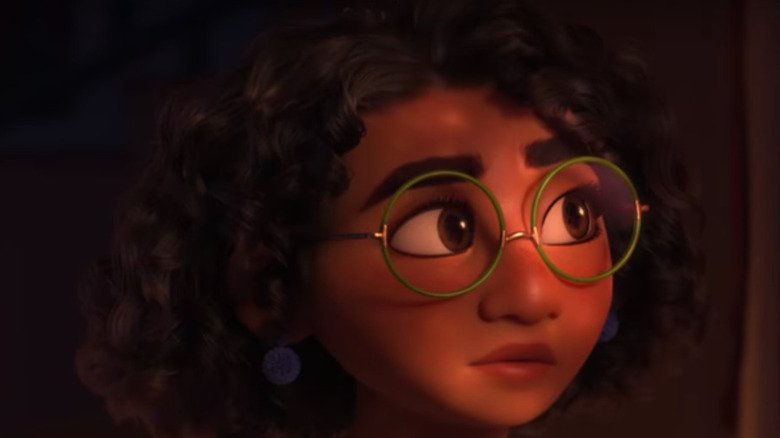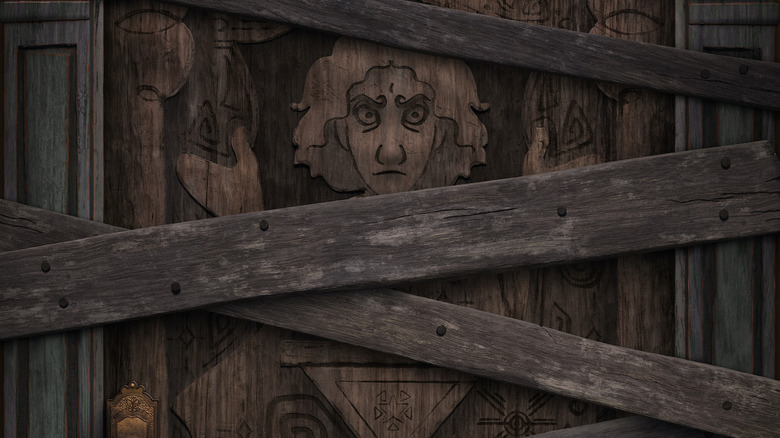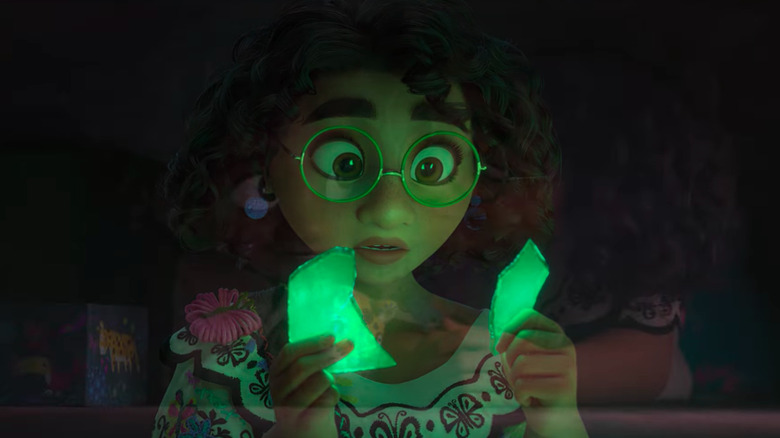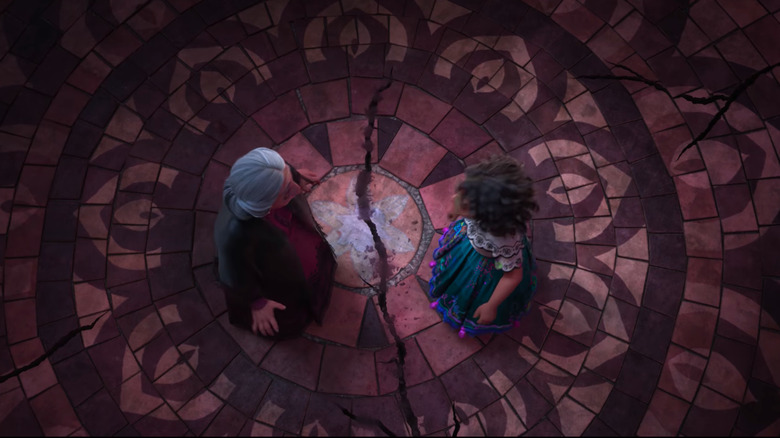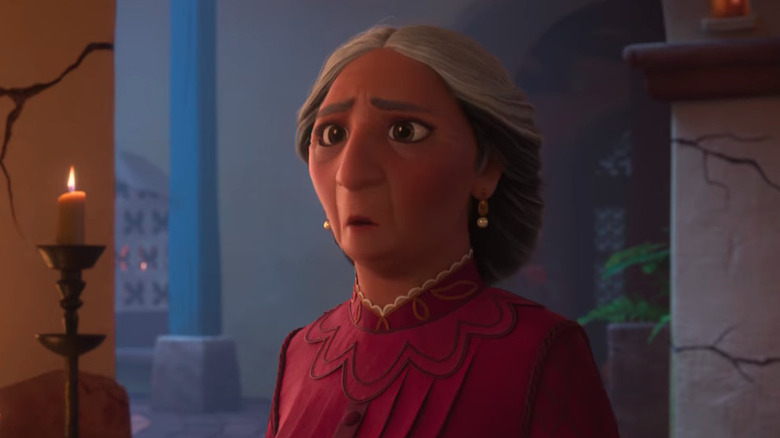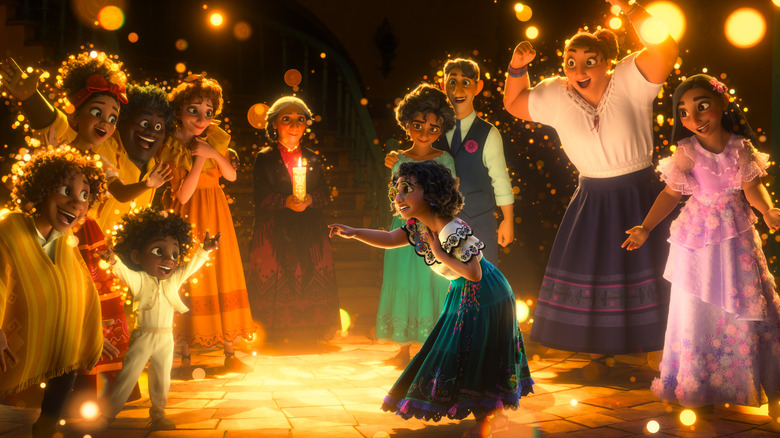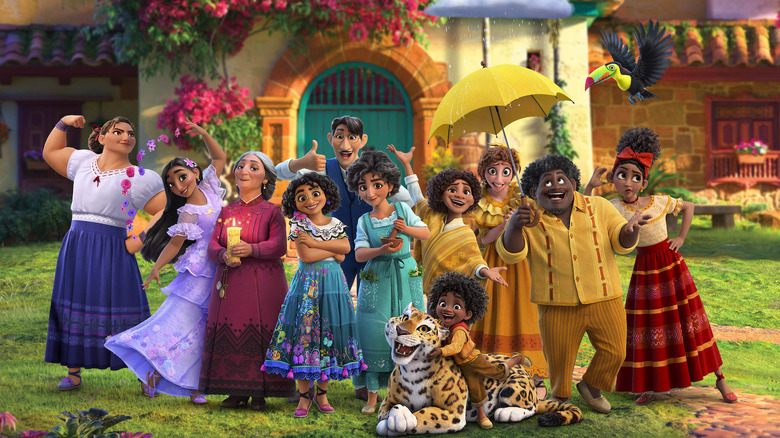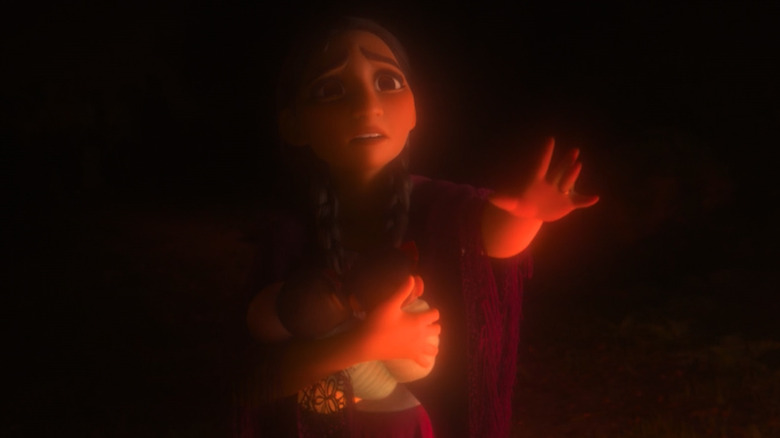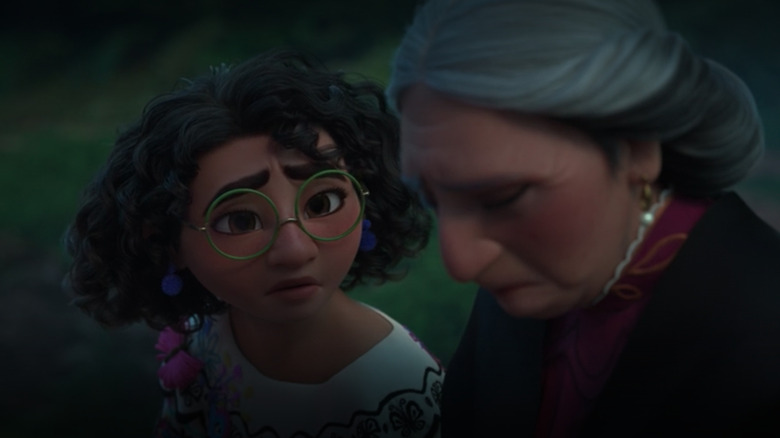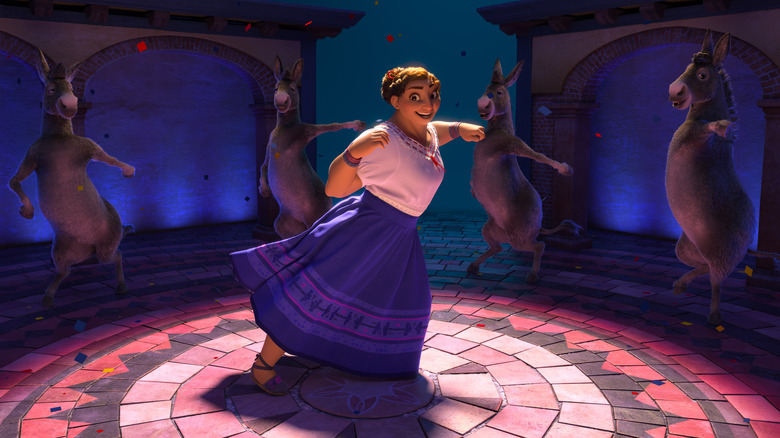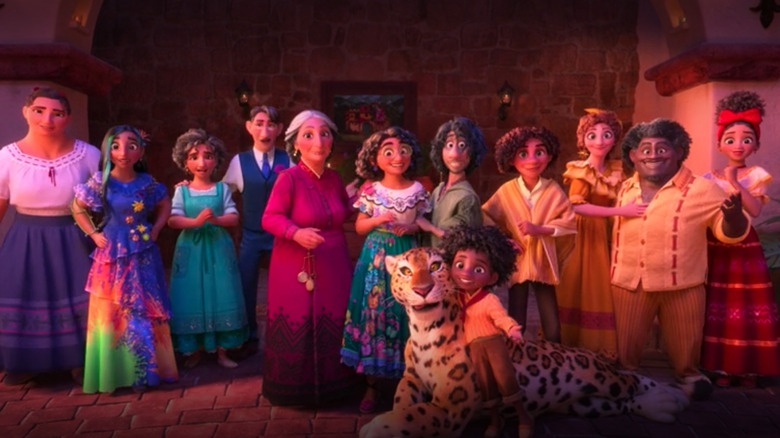The Ending Of Encanto Explained
The sprawling Madrigal family is the focus of Disney's animated feature "Encanto." Ever since matriarch Abuela Alma (María Cecilia Botero) fled her home with her baby triplets and settled in the mountains of Colombia, each family member has been given a unique gift that imbues them with fantastical powers. However, the miracle is beginning to falter and Mirabel (Stephanie Beatriz), the lone Madrigal who was denied a gift, may be their only hope for maintaining it.
Mirabel desperately wants to help her family and prove she's special too, even if it's not due to a supernaturally given gift. Yet we learn early in the film that Abuela Alma has become unable to see her family beyond their gifts, and Mirabel is a reminder that those gifts may not last indefinitely. So when Mirabel sees cracks forming in the Madrigals' house, Abuela dismisses her.
However, Mirabel knows what she saw and believes that her absent Uncle Bruno (John Leguizamo), who has the gift of foresight, is the key to understanding what's happening. She searches for him, only to discover broken shards of an image of a premonition that shows Mirabel in front of the Madrigals' crumbling house. It's an image that fills everyone who sees it with dread because it seems to indicate Mirabel is responsible for the bad luck that befalls the family. But Mirabel is determined to save them instead, kicking off the final act of the movie. Here's what happens during the ending of "Encanto."
A hole in the wall
When each Madrigal child receives their gift, the house creates a room just for them, and even though Bruno left, his room is still there behind a boarded-up door. Earlier in the film, after seeing cracks form in the house that then patched themselves, Mirabel entered Bruno's room in an effort to find answers. The family doesn't talk about Bruno — as is made abundantly clear in the song "We Don't Talk About Bruno" — but Mirabel believes he may know something about what could be happening to the magic that powers the Madrigals. While Mirabel finds glowing shards of etched glass showing a vision of her and the family's crumbling home in his room, she doesn't find Bruno, and therefore has no idea how to interpret the image.
Later, while walking along a corridor of the house, Mirabel notices a picture on the wall is crooked, and when she looks behind it, she finds a hole. She enters and finds none other than Bruno. Instead of leaving the family as the Madrigals assumed, Bruno has spent years living within the walls of the house, and between the isolation and the challenges that came with his ability to see the future, he comes across as a little odd. Bruno explains he disappeared after he saw the unnerving vision of Mirabel and the crumbling house, adding that the vision kept changing and he couldn't figure out what was really going to happen.
A vision extended
Given the unfinished nature of Bruno's vision, Mirabel asks him to look into her future again. Bruno protests, revealing that he doesn't use his gift anymore. After years of everyone assuming his intentions were impure when he told them their futures or that he was actually bringing the bad news he predicted to pass, Bruno became disenchanted with his ability. However, when Mirabel reasons that if he can see beyond the moment from his original vision, Bruno might be able to discover a way to prevent the Madrigals' magic from going out, he becomes more open to the idea of using his gift once more — but he needs a bigger space to do it.
Just then, Antonio (Ravi Cabot-Conyers), who recently received his gift of talking to animals, makes his presence known. Bruno's rat friends have filled Antonio in on what's going on and he offers his new giant animal-filled room for their purposes. Shortly afterward, we see Bruno and Mirabel sitting together in a clearing, and Bruno is using his power for the first time in years.
Bruno takes Mirabel's hands so she can see what he sees, and soon he's brought her to the vision of her future depicted in the image she found. However, he pushes past that point to a vision of Mirabel hugging her older sister Isabela (Diane Guerrero), which seems to heal the family's problems. Mirabel finds the vision perplexing, though — she and Isabela don't get along.
The joys of being imperfect
While Mirabel isn't thrilled with the idea, she's willing to do what it takes to help her family, so she seeks out Isabela with the intention of hugging her as Bruno's vision dictates. The last thing Isabela wants to do, however, is hug her sister. Isabela is the Madrigals' golden child, seemingly perfect in every way. Even her power — creating plants on demand — makes the world a more beautiful place. And given Mirabel has no gift at all, there's a great divide between the sisters in the best of times.
This isn't the best of times. Earlier, Mirabel ruined a dinner at which local hunk Mariano (Maluma) was supposed to propose to Isabela. So when Mirabel tries to get that hug, Isabela responds by yelling at Mirabel for destroying her moment. Isabela concedes she was only willing to marry Mariano because Abuela Alma approved of the match and admits she's spent her whole life being as perfect as possible for the good of the family, suppressing whole parts of herself in the process.
As Isabela yells, she sprouts flowers, until her anger reaches its apex and she creates a cactus. She's delighted by her prickly and imperfect creation, and it makes her wonder what else she can do with her powers if she doesn't have to be perfect. She and Mirabela sing "What Else Can I Do" as Isabela further celebrates the joys of embracing her true self.
A family feud
As Isabela's song ends and she and Mirabel arrive in the courtyard of the Madrigals' house, Abuela Alma is there to greet them. Isabela has spent the entirety of her song exploring the limits of her powers, which means she created plants that aren't beautiful but are a fuller expression of who she really is. This has caused her to make a mess of her dress and hair, turning them from put-together perfection to a colorful hodge-podge, and Abuela is furious to see it.
Yet Mirabel ends up bearing the brunt of Abuela's ire when she once again tries to express her concerns about the magic in the house flickering out. The Madrigals' gifts and their magical house is powered by a candle that Abuela prayed to during her flight from her original home 50 years ago. In the time since, the candle has never gone out, and the magical miracle has become the source of the Madrigals' identity in the community. So instead of taking her concerns seriously, Abuela is angered by Mirabel's repeated suggestions that the candle could go out and the magic could die. Abuela and Mirabel argue fiercely, and as they do, cracks start to appear in the foundation of the house, to the astonishment and horror of everyone in the family.
The magic is extinguished
As a crack splits the ground between granddaughter and grandmother, Mirabel springs into action. The house starts to crumble as Mirabel climbs to the open window where the Madrigal family's magical candle sits. The rest of the family saves one another from falling debris and runs from the house just as Mirabel reaches the candle, only to find that for the first time it has melted to a tiny husk.
Mirabel looks at the candle in horror, but can't dwell on what's happened because the upper stories of the house are starting to collapse. Mirabel falls with them, leaping and running to avoid the wreckage coming down all around her. But when the dust clears and the house is nothing more than a pile of rubble, Mirabel is nowhere to be found. The family, especially Mirabel's mother and father, don't know where she went and spread out into the nearby mountains and forest in the hopes of finding her. Ultimately, it's Abuela Alma who discovers Mirabel sitting by the side of a river that she hasn't gone near since she arrived in their current home half a century ago.
A family reconciliation
Now that the worst has come to pass, Abuela's anger has dissipated, but Mirabel is still hurt and defeated. Abuela reveals that the river Mirabel is sitting beside is where her husband and Mirabel's grandfather, Pedro, died while trying to defend her and their children from the people that forced them to leave their original home. Abuela's prayer to the candle came out of her anguish at the loss and it led her to their magically powered home in a hidden area of Colombia where the Madrigals and those that followed them could thrive.
However, after the collapse of their house, Abuela has come to realize she's been holding on too tight to the family's miracle. She was so traumatized by the loss of her husband that the idea of anything else bad happening, especially the loss of another family member, has caused her to see the family's gifts as a lifeline. It's why she hasn't been able to appreciate everything Mirabel has to offer and she sees her children and other grandchildren through the lens of their gifts. But Abuela is finally seeing clearly, and she and Mirabel reconcile.
As they do so, Bruno rides up on a horse. He's worried that Abuela is still angry with Mirabel and tries to take the blame for what happened to the house. But Abuela is no longer concerned with assigning blame and simply embraces her long-lost son.
The whole town comes together
Abuela, Bruno, and Maribel make their way back to the site of their former house. The family, long reliant on their gifts, don't know what to do since those gifts were extinguished along with the candle that powered them. As the only Madrigal who isn't magical, however, Mirabel tells them they can rebuild, and as the song "All of You" begins, Mirabel reassures the group that they're more than their gifts and can contribute to the construction of their new house without any magic.
As the family sings and Bruno apologizes and makes amends with his siblings, everyone in the adjacent town approaches. The people who had always relied on the Madrigals for leadership, assistance, and protection have come to offer their help to rebuild the family's home, lifting the Madrigals up in their time of need. The family and their neighbors work as a team and as they build the house together with Maribel in the lead, the Madrigals each learn to embrace who they are beyond their gifts. And by the time the house has been reconstructed, they can see one another clearly — including Mirabel, who they now realize is brave and clear-thinking in ways they hadn't previously recognized.
The magic is restored
With the house rebuilt and the Madrigals prepared to celebrate their triumph over tragedy, they hand Mirabel a specially designed doorknob. As the family encourages her, she puts it in its place in the front door and lets everyone in their newly constructed home. With the foundation of the Madrigal home restored, the candle reignites and the family members once again have each of their gifts.
However, while the Madrigals have reclaimed their miracle, the group can finally acknowledge that they have more to contribute to the family and the town. Now that they have each learned to appreciate themselves and one another beyond their gifts, they can move forward with the understanding that the magic is only one part of each of them. What they went through has, therefore, made them stronger as individuals and stronger as a family, making "Encanto" a powerful film about being yourself — and learning to see and appreciate the people you love, flaws and all.
Abuela and Colombia's Thousand Days War
"Encanto" is never specific about the event that forced Abuela Alma and her young family from their home 50 years before the start of the movie, but there are plenty of clues that suggest the movie is referencing a real historical conflict: the Thousand Days War, a civil war fought in Colombia between 1899 and 1902. The war pitted conservatives against liberals, who were outraged after an 1898 presidential election they expected was fraudulent. After the liberals were defeated in the first phase of the war, they resorted to guerrilla tactics in rural areas for the next two and half years before finally surrendering.
It's during this phase of the war that Abuela's family was displaced and Mirabel's grandfather was killed. The battles during this phase of the war were highly disorganized, resulting in thousands of deaths and a great deal of property destruction. While "Encanto" never specifies whether Abuela Alma supported the liberal or conservative side, given the chaotic nature of the war, it may have simply been bad luck that led to her village being caught up in the fighting. Still, the long-ago experience of being forced to flee her home and seeing her husband killed in front of her led Abuela to cling to the safety that her new home and her family's gifts provide.
Abuela's trauma has been passed down through generations
When war came to their village, Abuela Alma had no choice but to leave a place that, based on the movie's depiction of it, had previously been a happy home for her and her husband. That experience alone would be traumatic, but the fact that it also led to Pedro's death meant the deep pain Abuela experienced was even more overwhelming. Even though throughout the film Abuela talks up the miracle that protected their family on that fateful day — and how it continues to benefit their community — underneath her positive exterior lies a well of trauma that's impacted every member of the Madrigal clan, leading to a family that's suffering from all the signs and symptoms of intergenerational trauma.
Even though Mirabel and the rest of Abuela's grandchildren didn't experience the trauma that led the family to their current home, Abuela's expectations and attitudes have had an outsized impact on them, constraining the way they behave and who they believe they can be. The Madrigals each choose to cope differently: Mirabel's flower-powered sister Isabela tries to live up to the family's every expectations, to the detriment of her own wants and needs; strong sister Luisa is riddled with anxiety because she believes if she's not helping the community she's worthless; and Mirabel spends most of her time denying the fact that her lack of a gift has left her scarred and uncertain.
Mirabel's sisters suffer from imposter syndrome
The trauma that is an inextricable part of the Madrigals' origin story has also led some of the members of the family to suffer from imposter syndrome. While it's possible others in the Madrigal clan have this issue, the movie illustrates it through the characters of Isabela and Luisa, who each believe they may not be as perfect or strong as the rest of their family and the people in the community believe they are. This has caused them both to overachieve, which makes it appear as though they're both happy and successful in their roles in the town. However, the songs both characters sing in the movie indicate otherwise.
In her song "Surface/Pressure," Luisa expresses her concerns about failing to live up to her strong image, a fear that drives her to tackle any task as quickly and efficiently as possible. However, while she acts like she's comfortable doing so much work, inside, her feelings of overwhelm and exhaustion leave her feeling weak, riddled with self-doubt, and possibly even depressed. Meanwhile, Isabela is the star of the family, and her place as the picture of perfection has led her to continue to keep up appearances — even though, until she lets that control go in her song "What Else Can I Do," she's secretly afraid her family and neighbors will realize she's a lot messier than they know.
A healing conclusion
While "Encanto" makes it clear that the Madrigal family, both as individuals and a whole, has been dealing with some big issues, by the conclusion of the film they've begun to tackle the intergenerational trauma that's impacted all of them — and started the healing process. This is triggered when Mirabel seeks out Bruno, forcing the family to talk about him for the first time in a decade. While the conversation initially scares many of the family members, based on the song "We Don't Talk About Bruno," many of them are also happy to finally let their suppressed feelings about Bruno out.
This initially leads to greater turmoil in the family, but eventually it forces Abuela to recognize her children and grandchildren have more to offer than just their gifts. When it comes to intergenerational trauma, an adjustment by one member of the family impacts the whole family, and Abuela's change of heart also makes the other family members see that there's more to life than their gifts. As they rebuild their destroyed house together, they come to embrace themselves and each other, flaws and all. By becoming more open and accepting, the Madrigals start to move past their trauma and become a happier, healthier family.
